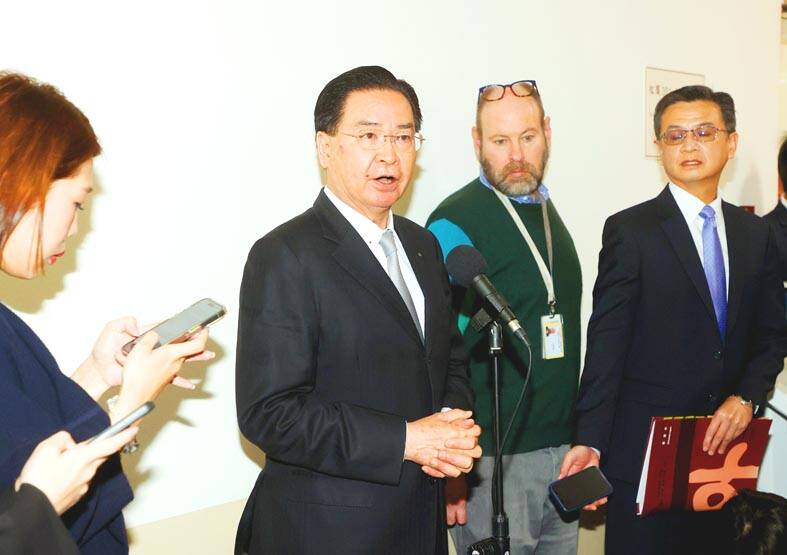Now is not an appropriate time for President Tsai Ing-wen (蔡英文) to visit Itu Aba Island (Taiping Island, 太平島), due to recent skirmishes between Chinese and Philippine coast guard vessels in the South China Sea, Minister of Foreign Affairs Joseph Wu (吳釗燮) said yesterday.
Wu made the remarks after Chinese Nationalist Party (KMT) Legislator Ma Wen-chun (馬文君) called on Tsai to visit the Taiwan-controlled island to reaffirm the nation’s sovereignty following the completion of a dredging project on Taiping to allow larger vessels to dock.
Former presidents Chen Shiu- bian (陳水扁) of the Democratic Progressive Party and Ma Ying-jeou (馬英九) both visited the island before stepping down, Ma Wen-chun said.

Photo: CNA
Ma Wen-chun, a convener of the legislature’s Foreign Affairs and National Defense Committee, on Tuesday proposed forming a legislative delegation to visit Taiping on May 16.
Asked to comment on the matter at a legislative session yesterday, Wu said that no matter whether Tsai visits, there is no doubt that Taiping is Taiwan’s territory.
Due to skirmishes between China and the Philippines in the South China Sea over the past months, now is not an appropriate time for her to visit, he said.
With the Chinese government sending about 20 warships to patrol the South China Sea on a daily basis, a trip from Tsai could create a negative impression of Taiwan to the international community “as a troublemaker in the region,” he said.
Nevertheless, the central government fully respects the rights of Ma Wen-chun and other committee members to visit Taiping for an inspection tour, Wu said.
The Coast Guard Administration announced the completion of the dredging project to allow larger vessels to dock at a pier serving Taiping earlier this year.
The NT$1.7 billion (US$53.35 million) project to dredge sediment and deepen navigation channels would enable 4,000-tonne coast guard vessels to dock at the island for resupply, it said.
Wu also told reporters that China has built “enormous” military bases on three islands surrounding Taiping, but Taipei is not looking to escalate tensions in the strategic waterway.
“China has already created very enormous South China Sea military bases on the three islands surrounding Taiping — Subi Reef [Jhubi Reef, 渚碧礁], Fiery Cross Reef [Yongshu Reef, 永暑島] and Mischief Reef [Meiji Reef, 美濟礁] — and these are all quite close to our Taiping,” he said.
Taiping, the largest of the Spratly Islands (Nansha Islands, 南沙群島), lies 1,600km southwest of Kaohsiung, and is administered by the city’s Cijin District (旗津). It hosts about 200 coast guard personnel trained by the Marine Corps, and is also claimed by China, the Philippines and Vietnam.
The island has a runway long enough to land military resupply flights from Taiwan, but is lightly defended compared with the nearby Chinese-controlled reefs. Chinese forces generally leave the island alone.
China has carried out extensive land reclamation on territory in the South China Sea, building major air force and other military facilities, causing major concern in Washington and around the region.
China’s air force and navy regularly operate nearby the Taiwan-controlled Pratas Islands (Dongsha Islands, 東沙群島).

The Central Election Commission has amended election and recall regulations to require elected office candidates to provide proof that they have no Chinese citizenship, a Cabinet report said. The commission on Oct. 29 last year revised the Measures for the Permission of Family-based Residence, Long-term Residence and Settlement of People from the Mainland Area in the Taiwan Area (大陸地區人民在台灣地區依親居留長期居留或定居許可辦法), the Executive Yuan said in a report it submitted to the legislature for review. The revision requires Chinese citizens applying for permanent residency to submit notarial documents showing that they have lost their Chinese household record and have renounced — or have never

A magnitude 5.6 earthquake struck off the coast of Yilan County at 12:37pm today, with clear shaking felt across much of northern Taiwan. There were no immediate reports of damage. The epicenter of the quake was 16.9km east-southeast of Yilan County Hall offshore at a depth of 66.8km, Central Weather Administration (CWA) data showed. The maximum intensity registered at a 4 in Yilan County’s Nanao Township (南澳) on Taiwan’s seven-tier scale. Other parts of Yilan, as well as certain areas of Hualien County, Taipei, New Taipei City, Taoyuan, Hsinchu County, Taichung and Miaoli County, recorded intensities of 3. Residents of Yilan County and Taipei received

Taiwan has secured another breakthrough in fruit exports, with jujubes, dragon fruit and lychees approved for shipment to the EU, the Ministry of Agriculture said yesterday. The Animal and Plant Health Inspection Agency on Thursday received formal notification of the approval from the EU, the ministry said, adding that the decision was expected to expand Taiwanese fruit producers’ access to high-end European markets. Taiwan exported 126 tonnes of lychees last year, valued at US$1.48 million, with Japan accounting for 102 tonnes. Other export destinations included New Zealand, Hong Kong, the US and Australia, ministry data showed. Jujube exports totaled 103 tonnes, valued at

BIG SPENDERS: Foreign investors bought the most Taiwan equities since 2005, signaling confidence that an AI boom would continue to benefit chipmakers Taiwan Semiconductor Manufacturing Co’s (TSMC, 台積電) market capitalization swelled to US$2 trillion for the first time following a 4.25 percent rally in its American depositary receipts (ADR) overnight, putting the world’s biggest contract chipmaker sixth on the list of the world’s biggest companies by market capitalization, just behind Amazon.com Inc. The site CompaniesMarketcap.com ranked TSMC ahead of Saudi Aramco and Meta Platforms Inc. The Taiwanese company’s ADRs on Tuesday surged to US$385.75 on the New York Stock Exchange, as strong demand for artificial intelligence (AI) applications led to chip supply constraints and boost revenue growth to record-breaking levels. Each TSMC ADR represents